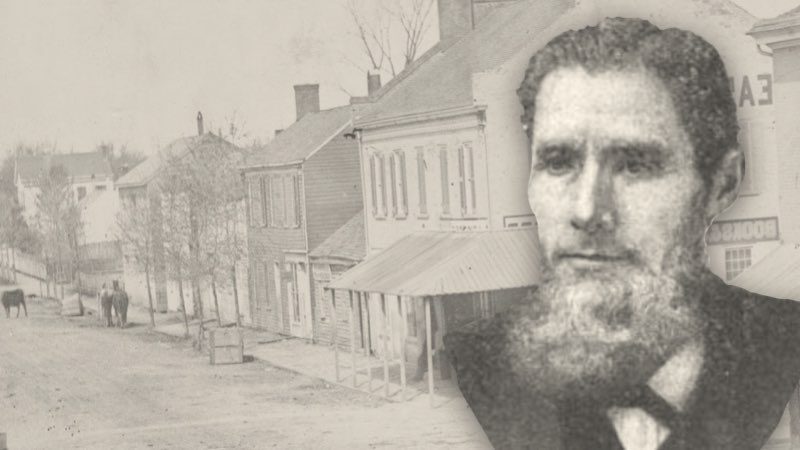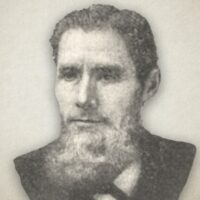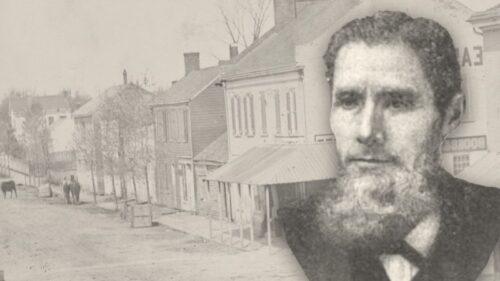
Trials And The Fallacy Of Time Salvation
Signs Of The Times 1899:
Crawfordsville, Ind., Nov. 19, 1899.
Elder F. A. Chick – Very Dear Brother In Christ: – The shadow of night is upon our part of the earth, and also a dark mantle of sorrow has fallen upon my spirit to-night, and my heart is troubled, without my scarcely knowing why; for I still realize “The Lord is good, a stronghold in the day of trouble: and he knoweth them that trust in him,” and truly my soul does trust in him. “He is my soul’s sweet morning star, and be my rising sun. “And my sad heart would make this humble appeal to him: “Do not I love thee, O my Lord? Behold my heart and see, And turn each cursed idol out, That dares to rival thee.”
I cannot believe that it is always for some known or willful neglect or disobedience that we are sorrowful and afflicted in spirit, or that felt darkness of soul is the Father’s rod of chastisement, necessarily; for many other things may cause this, as so often spoken of in the experience of “holy men of old,” as also in the perfectly obedient life of the holy Son of man, while in the days of his flesh. His sufferings in the flesh touch my own sorrowful heart now with a deep and tender sympathy, and with solace, as balm to my burdened spirit, while the thought arises, O! have I fellowship with Christ in his sufferings! and am I worthy to suffer for his sake? If so, then my sufferings and sorrows are sanctified of God, and I am blessed in them. This brings touchingly before me the expressive words of Jesus: “Blessed are they that mourn.” To-night my heart mourns, not on account of any fleshly trouble, or natural sorrow, but because of so much imperfection and infirmity in myself, and all around me, so that my very soul cries out, “O wretched man that I am! who shall deliver me from the body of this death?” In this sorrowful state that I am in now, the deep and true meaning of the excellent editorial of brother B. L. Beebe in the last issue of the Signs comes with greater power and comfort to my mind than when I read it, though I felt its solemn truth then. But there are times in our experience of salvation, of salvation from all that we need to be saved from, when the dear Lord is pleased to show us our utmost weakness and greatest need, and then are we truly humbled and brought into the very realization of the words of Christ: “For without me, ye can do nothing.” When Jonah confessed that “Salvation is of the Lord,” his state and environment made him both know and feel this truth, even before the Lord saved him. And so in our realization of salvation in all its manifestations, we are first brought into the helplessness and utter need that Jonah felt, and then we have the certain knowledge that personal experience only can bring, that the Lord alone can raise us up out of the pit, the deep water, the darkness, sorrow and trial, and save us. I feel this truth now, because it is brought home to my heart; and I have no power to save myself, to bid the darkness flee, to say to my soul,” Rejoice in the Lord.” O that I could be glad and rejoice, as in other times, when the Lord lifted upon me the light of his countenance.
Jesus knew perfectly the sinfulness of the flesh, the weakness of man, for he was in the flesh, and to his three chief apostles he said, “The spirit indeed is willing, but the flesh is weak.” And of himself as a man he said, “I can of mine own self do nothing.” Then, O how much more true this is of weak and sinful me! It is not as a dry doctrine, a mere theory, that I confess this, for I am down in the depths, and sadly, painfully do I feel its deep reality. Yea, God has caused me to feel it many times before to-night, very many; but I am so dull and weak that I forget, and seem to be walking safely and pleasantly on, above the shadows, as if my mountain stood firm and strong, when, lo it is night, and I am in trouble.
Dear brother Chick, I will now try to complete my present message to you, twenty-four hours having elapsed since I wrote last night. I hope that it was not “love’s labor lost,” but may meet a response in your heart, “As face answereth to face in water,” and be to you a little comfort. It presents my experience by far the larger part of the time, for my spiritual walk is largely in “the valley of the shadow of death,” and it is a low valley, as you yourself know; so low and so dense the shadow that from very necessity the pilgrim who sojourns in it walks by faith, not by sight At times there are indeed rifts in the shadowy clouds, because to the trembling, weak and fearing wayfaring ones the Sun of righteousness arises with healing in his wings of light and love, and then there is peace and gladness in the soul, and thus revived and inspired we each say, “I will fear no evil; for thou art with me; thy rod and thy staff they comfort me.” The staff of the good Shepherd is to lean upon, while the rod or crook is to guide the sheep through the valley and the wilderness, that they lose not the safe and good way, up to the green pastures on the mountain sides, where they lie down and find rest. The Lord, the Shepherd, leads the sheep of his pasture in all this way in which the redeemed walk, and he will neither leave nor forsake them. How rich the divine mercy that we shall not always walk in the deep valley of the dismal shadow of death, but shall safely walk through it, and leave the valley, the shadow, the gloom and the sorrow, for the life and light immortal, where there is no need of any earthly light, for the glory of God shining in the face of the Lamb, who is the life and the light, giveth light to all the blest inhabitants of the holy Mount Sion. So, my brother, as certainly as we walk in the valley of the shadow of death, we shall also walk through it, and its farthest border terminates upon the “heavenly country,” where there is not the fear of even the shadow of death. But how precious the divine assurance that it is only the shadow of death that pilgrims to the “better country “now walk in, and that death itself is behind them, and they have been “brought up out of this horrible pit,” “quickened and raised up together with Christ; but death, the conquered monster, casts its grim shadow across this low valley where pilgrims now walk. Plainly, my brother, we now talk in the flesh, which is as a dark vail, so dark that its chilling gloom hangs over the spirit of the sojourning child of our Father in heaven as the very shadow of death. Yet this is the way the patriarchs and prophets walked; yea, my brother, all the redeemed unto God and the Lamb, who have gone on before us, have walked down in this lowly vale, and this heavy shadow has hung over them, and it has fallen upon them “as the horror of a great darkness,” causing them to mourn in sorrow and weakness, and to go tremblingly and softly on. “The children are partakers of flesh and blood;” therefore the days of the life of their pilgrimage are few and full of trouble, and to them it is given to “sow in tears,” before they shall reap in joy. This is the way our God has foreordained; therefore, it is through much tribulation that we must enter the heavenly and holy kingdom of God our Father. The experience of the apostle Paul, as told by himself in {Ro 7}, is likewise the experience of every one “saved by the Lord,” an experience of utmost inability or weakness, and of sorrow and wretchedness, so that all thanksgiving to God is “through Jesus Christ our Lord.” Paul would have had it otherwise, and so would we, but the Lord said to him, “My grace is sufficient for thee: for my strength is made perfect in weakness. Most gladly therefore will I rather glory in my infirmities, that the power of Christ may rest upon me.” This, and only this, prepared Paul to attribute all the power and glory of his eminent service in the work of the gospel ministry to the Lord Jesus, and his sufficient grace. It is an humbling but needful lesson of experience that we be taught to rather glory in our infirmities and confess our weakness, to the end that the power of Christ may rest upon us also than to trust in man, or depend upon ourselves in the spiritual service of our God. O, so sorrowfully do I realize the force of this in myself; therefore, all that I have thus written is out of a heartfelt and sad realization that it is so, but not in the way of controversy at all. For I have the same tendencies, of the fleshly mind that other brethren have, and this is ever a legal tendency, because all that pertains to ourselves as born of the flesh is legal, and ever leads us to trust in and depend upon ourselves. I find this principle in myself continually, in all my devotions, and services in the gospel ministry; and I humbly confess to you, my brother, that it has been and yet is only through a very sorrowful and suffering experience, which deeply abases me, that I am afraid to trust in myself, or rely upon any ability that I already have to obey and worship and serve God; for try as I may, I utterly fail, disappoint myself, and feel that I have deep cause for self-shame at my own presuming ignorance and weakness, in supposing that I was something, and could accomplish something good and worthy, when I was nothing. Therefore I cannot believe that any moment of salvation, or any spiritual blessing, is in our own hands, or depends upon ourselves, for we ourselves are certainly as utterly without the ability to do the good that we would as Paul was, and are absolutely dependent upon the power of God to keep us unto salvation; and he does this through the faith which is his gift. So, then, we are continually dependent upon God and his grace in every act of true obedience and acceptable service to him. God has taught me this in my sorrowful and heartfelt experience, and is teaching it to me more and more, and it is my solemn understanding of what his prophets and apostles have recorded in his holy oracles, if he has taught me any divine truth at all, and I do verily believe he has. God has taught me to realize and feel the depth of my underserving’s, and that in my entire being of spirit and soul and body, I am infinitely indebted to his rich mercy and abounding grace for salvation and blessing in all their fullness and amplification, both now and forever. So, my precious brother in Christ our only Savior, should all our people believe and teach otherwise, and affirm that our salvation in time is conditional, and that our gospel or spiritual blessings depend upon ourselves, and are received as conditional rewards because of or for our obedience to God, it would not be possible for me to believe it, because the Scriptures and my own suffering experience, from November, 1846, till now, teach me that it is not true; and because it contradicts the new covenant of grace, which is unconditional, and depends entirely upon the Lord to perform and fulfill it. The perfectly obedient and holy Son of man himself said, “I can of mine own self do nothing: as I hear, I judge: and my judgment is just; because I seek not mine own will, but the will of the Father which hath sent me.” “I am in the Father, and the Father in me: the words that I speak unto you I speak not of myself: but the Father that dwelleth in me, he doeth the works. “In harmony with this, his servant Paul says, “For I know nothing by myself; yet am I not hereby justified; but he that judgeth me is the Lord.” “And such trust have we through Christ to Godward: not that we are sufficient of ourselves to think anything as of ourselves; but our sufficiency is of God; who also hath made us able ministers of the New Testament; not of the letter, but of the spirit: for the letter killeth, but the spirit giveth life.” These are creature-humbling truths, but they exalt God, and glorify his Son and Spirit. Deeply do I feel in my spirit the divine force of the words of Jesus: “I can of mine own self do nothing;” and thus taught, I confess my entire and unceasing dependence upon the Father Almighty for wisdom and strength to both suffer and do his will.
I remain as ever, your poor brother,
D. Bartley
David Bartley (1826-?) was an American Primitive Baptist preacher. He served the pastorate of several churches and became a popular itinerate preacher traveling to many parts of the United States. He was a frequent contributor to Gilbert Beebe’s the Signs of the Times and was the author of several books.




